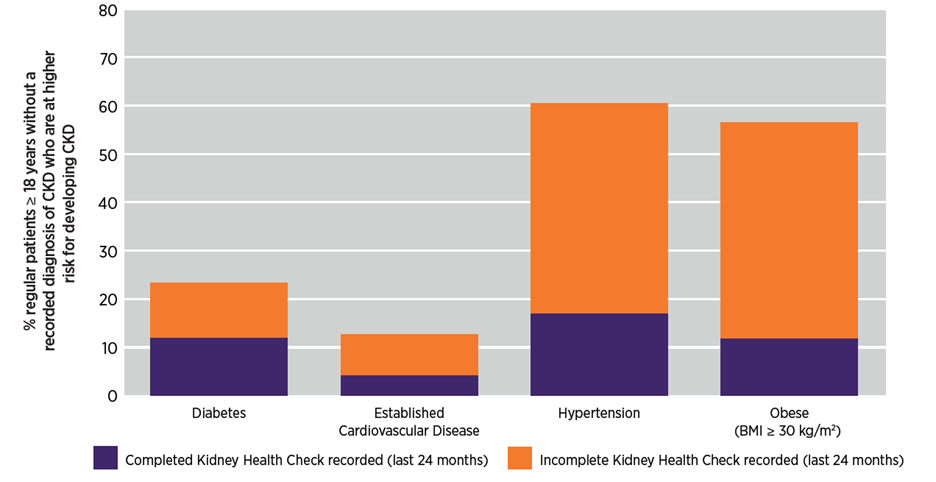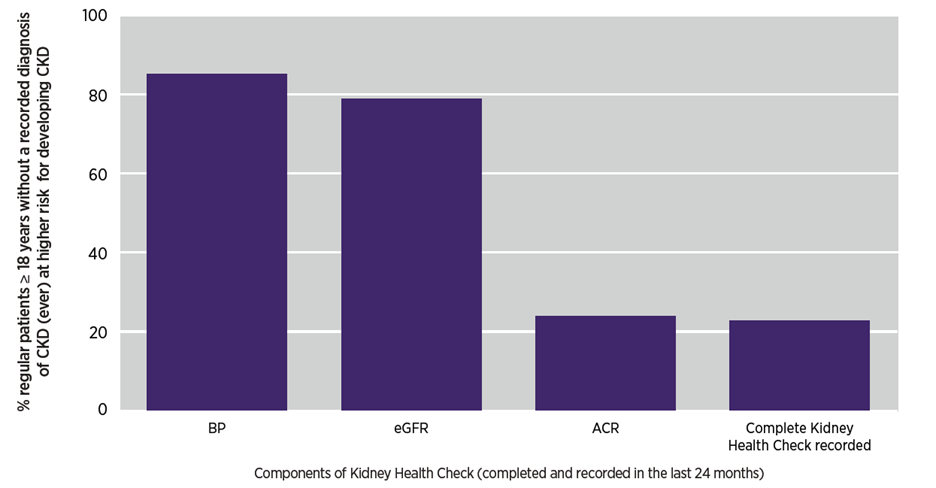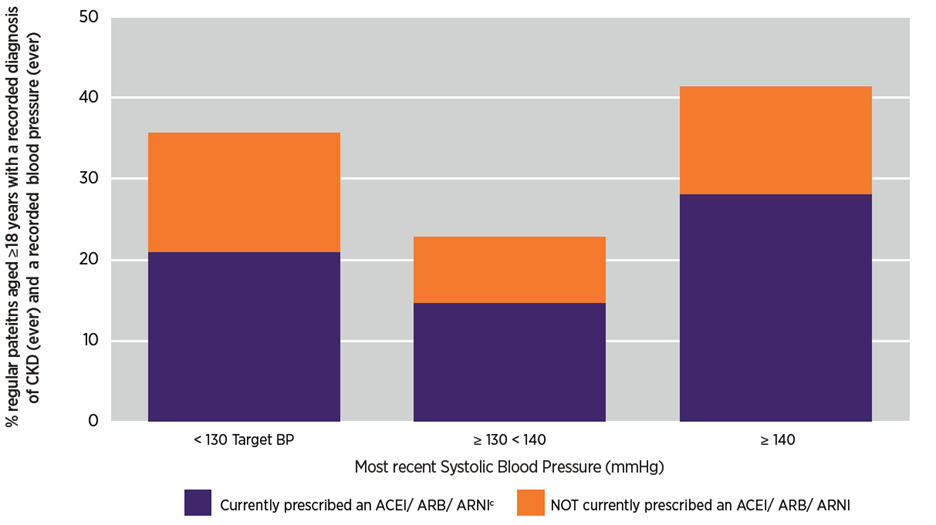MedicineInsight data snapshot: chronic kidney disease: early detection and management

The 2022 NPS MedicineWise national program Chronic kidney disease: early detection and management focuses on diagnosing and managing patients with, or at risk of developing, chronic kidney disease (CKD).
To support the delivery of this program, individual practice and aggregate data were extracted from eligible general practices in the MedicineInsight program. The key insights from the aggregate data obtained on 1 July 2022 are presented below.
MedicineInsight (www.medicineinsight.org.au) is a national primary healthcare data and quality improvement program developed and managed by NPS MedicineWise with funding from the Australian Government Department of Health and Aged Care. The program collects de-identified information from medical records held in the clinical information systems at participating MedicineInsight practices across Australia.
Download a PDF of the aggregate data snapshot below.
Prevalence of CKD
Of all regulara patients aged ≥ 18 years presenting to a MedicineInsight practice, 2% have a recorded diagnosis of CKD (ever).
- 70.1% of these patients have a stage of CKD recorded in the clinical information system (CIS).
While only 2% of regulara patients aged ≥ 18 years presenting to a MedicineInsight practice have a recorded diagnosis of CKD (ever), of the other 98%:
- 5.5% have biomarkers indicating probableb CKD.
- 39.4% are at riskc of developing CKD.
aRegular patients are those that have visited the practice ≥ 3 times in the last 2 years.
bminimum of three estimated glomerular filtration rate (eGFR) results < 60 mL/min/1.73 m2 present for 90 days or more and/or a minimum of 2 out of 3 elevated urine albumin-creatinine ratio (ACR) results (males ≥ 2.5 mg/mmol, females ≥ 3.5 mg/mmol) present for 90 days or more.
cpatients with one or more of the following: diabetes, established cardiovascular disease, hypertension, obesity (BMI ≥ 30 kg/m2).
Are patients at risk of developing CKD receiving a Kidney Health Check?
Figure 1. Regular patients ≥ 18 years at risk of developing CKD who have or have not had a completed Kidney Health Check in the last 24 months

Figure 1 shows the percentage of regular patients aged ≥ 18 years without a recorded diagnosis of CKD, but with recorded risk factorsd for developing CKD who have and who have not received a completed Kidney Health Checke in the last 24 months.
Read accessible tables of the data in this report
dTotal exceeds 100% as patients with more than one risk factor may be counted in more than one group.
eA Kidney Health Check consists of blood pressure, eGFR and urinary ACR recording in the CIS.
Figure 2. Components of a Kidney Health Check recorded for patients at risk of developing CKD

Figure 2 shows that in the last 24 months, of regular patients aged ≥ 18 years who are at higher risk of developing CKD:
- 85% have a blood pressure result recorded
- 79% have an eGFR result recorded
- 24% have an ACR result recorded.
Overall, 23% of regular patients aged ≥ 18 years who are at higher risk of developing CKD have had a completed Kidney Health Checke recorded.
Read accessible tables of the data in this report
Management of patients with CKD
Figure 3. Blood pressure management for patients with a recorded diagnosis of CKD

Figure 3 shows the percentage of regular patients aged ≥ 18 years with a recorded diagnosis of CKD (ever) and blood pressure recorded (ever) and current prescribing of an ACEI or ARB or ARNIf. Ranges of blood pressure are based on the systolic blood pressure.
Read accessible tables of the data in this report
fACEI = angiotensin-converting enzyme inhibitor; ACR = albumin-to-creatinine ratio; ARB = angiotensin receptor blocker, ARNI = angiotensin receptor-neprilysin inhibitor. Patients with CKD and heart failure may be prescribed an ARNI as a replacement for an ACEI or ARB.
Additional data points
- 37% of regular patients ≥ 18 years with CKD are not currently prescribed an ACEI or ARB or ARNI.
- 82% of regular patients ≥ 18 years with CKD and type 2 diabetes are not currently prescribed a sodium-glucose co-transporter-2 inhibitor.
Accessible tables
Table 1. Regular patients ≥ 18 years at risk of developing CKD who have or have not had a completed Kidney Health Checke in the last 24 monthsd.
| Risk factors for developing CKD | % with a completed Kidney Health Check recorded (last 24 months) | % with an incomplete Kidney Health Check recorded (last 24 months) |
| Diabetes | 11.9 | 11.5 |
| Established cardiovascular disease | 4.1 | 8.6 |
| Hypertension | 17 | 43.6 |
| Obese (BMI ≥ 30 kg/m2) | 11.8 | 44.8 |
Table 2. Components of a Kidney Health Check recorded for patients at riskc of developing CKD.
| Component of a Kidney Health Check | % completed and recorded in the last 24 months |
| BP | 85.3 |
| eGFR | 79 |
| ACR | 24 |
| Complete Kidney Health Check | 22.8 |
Table 3. Regular patients ≥ 18 years with a recorded diagnosis of CKD (ever) and blood pressure recorded (ever) and current prescribing of an ACEI or ARB or ARNIf.
| Systolic Blood Pressure (mmHg) | % currently prescribed an ACEI/ ARB/ ARNI | % not currently prescribed an ACEI/ ARB/ ARNI |
| < 130 (target BP) | 20.9 | 14.8 |
| ≥ 130 < 140 | 14.6 | 8.2 |
| ≥ 140 | 28.1 | 13.3 |
